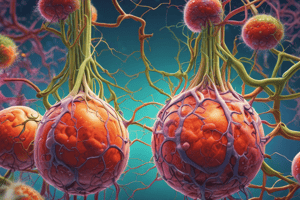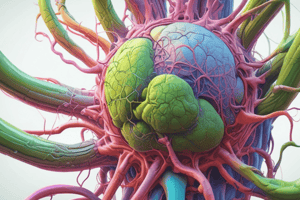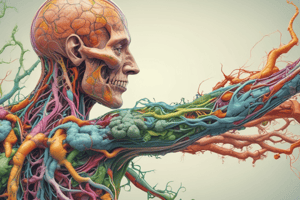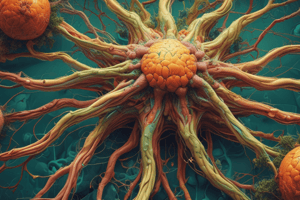Podcast
Questions and Answers
What is the primary function of the lymphatic system in the body?
What is the primary function of the lymphatic system in the body?
- To digest food in the digestive system
- To produce antibodies to fight infections
- To maintain the balance of fluids in the body (correct)
- To transport oxygen to the body's tissues
What happens to the remaining 3 liters of fluid that seep into the body's tissues?
What happens to the remaining 3 liters of fluid that seep into the body's tissues?
- It is excreted by the kidneys
- It is collected by the lymphatic system (correct)
- It is transported back to the bloodstream
- It is absorbed by the digestive system
What is the result of a defect in the lymphatic system that prevents it from draining fluids properly?
What is the result of a defect in the lymphatic system that prevents it from draining fluids properly?
- An increase in blood pressure
- A decrease in body temperature
- Edema and eventually lymphedema (correct)
- An increase in heart rate
How much fluid is transported from the blood vessels to the tissues of the body?
How much fluid is transported from the blood vessels to the tissues of the body?
What is the name of the fluid that is transported by the lymphatic system?
What is the name of the fluid that is transported by the lymphatic system?
What is the role of the lymph nodes in the lymphatic system?
What is the role of the lymph nodes in the lymphatic system?
What is the main function of villi in the small intestine?
What is the main function of villi in the small intestine?
What is the primary function of lymph nodes in the body?
What is the primary function of lymph nodes in the body?
What is the name of the milky white fluid produced by the absorption of fats and fat-soluble vitamins in the small intestine?
What is the name of the milky white fluid produced by the absorption of fats and fat-soluble vitamins in the small intestine?
What is the function of the lymphatic vessels in the lymphatic system?
What is the function of the lymphatic vessels in the lymphatic system?
What is the name of the condition where lymph nodes swell due to inflammation or cancer?
What is the name of the condition where lymph nodes swell due to inflammation or cancer?
What is the function of the red pulp in the spleen?
What is the function of the red pulp in the spleen?
Flashcards are hidden until you start studying
Study Notes
The Lymphatic System
- The lymphatic system is an important part of the body's immune system and maintains fluid levels in the body.
- It absorbs fats in the digestive system and plays a crucial role in preventing infections.
Lymphatic Fluid
- The lymphatic system transports lymphatic fluid, a colorless, watery fluid, to the blood vessels and returns it to the tissues via the lymph nodes.
- About 20 liters of plasma flow through the blood vessels to the body's tissues, and 17 liters return to the blood veins, leaving 3 liters as lymphatic fluid.
Functions of the Lymphatic System
- Maintains the balance of fluids in the body by collecting excess fluids from the tissues and returning them to the bloodstream.
- Absorbs fats and proteins from the intestine and transports them to the bloodstream.
- Prevents infections and removes excess fluids in the intestine.
- Protects the body from infection by releasing lymphocytes (white blood cells) as part of the defense and protection of the body.
- Fights cancer cells.
Parts of the Lymphatic System
- Lymphatic vessels: found in all parts of the body, responsible for absorbing fluids, and contain valves that prevent the return of lymphatic fluid.
- Lymph nodes: approximately 600 in the body, found in areas such as the armpit, groin, and neck, responsible for defending the body through manufacturing and storing lymphocytes.
- Spleen: the largest lymphatic organ, located in the upper left part of the abdomen, responsible for purifying and storing blood, making white blood cells, and destroying old or damaged red blood cells.
Importance of the Lymphatic System
- A defect in the lymphatic system prevents it from properly draining fluids, leading to Edema and potentially lymphedema.
- The lymphatic system plays a crucial role in fighting infections and removing excess fluids in the intestine.
Studying That Suits You
Use AI to generate personalized quizzes and flashcards to suit your learning preferences.




